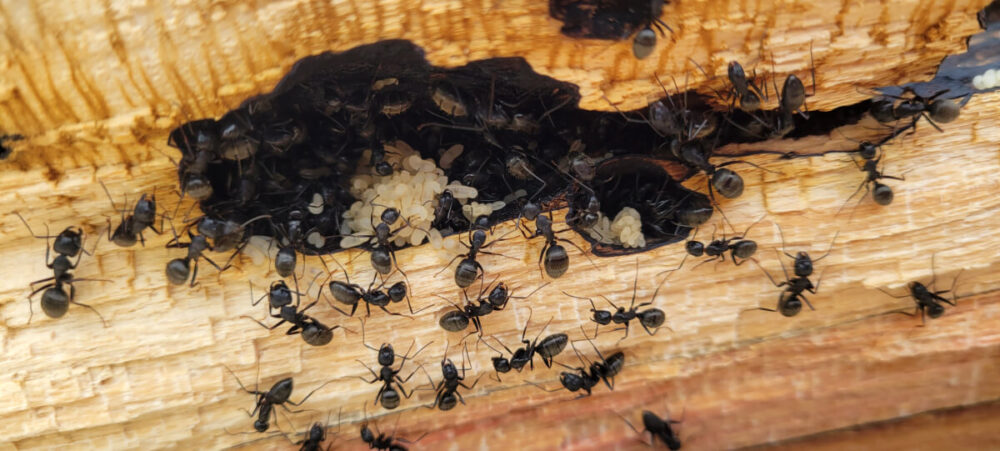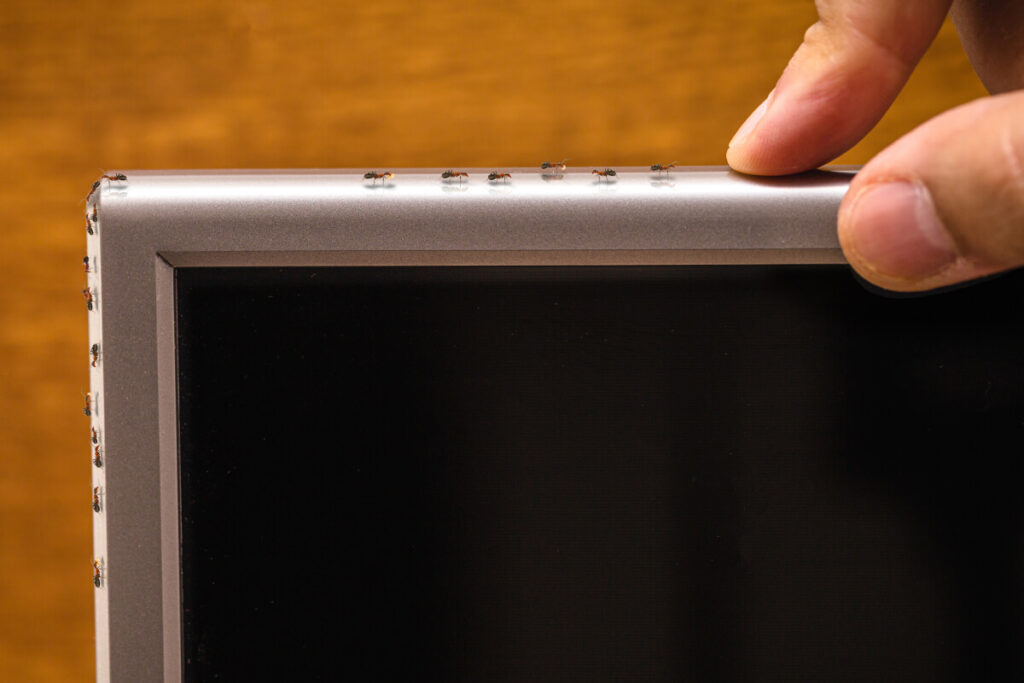
You want to prevent ant infestations, so you keep your kitchen clean 24/7. All appeared to be well as you saw no signs of ants until one fateful night when you caught their trail in a place you least expected it - your TV components. Aside from food and moisture, carpenter ants are also attracted to TV components and other electronic appliances. This might be bad news for those enjoying movie nights every weekend with snacks.
So why are carpenter ants attracted to TV components? Some ants, including carpenter ants, are attracted to TV components because they serve as the perfect cavity for them to nest in. Carpenter ants don't dig their own holes but only search for hollow openings for the entire ant colony to stay in. It's not only your TV components they'll be after - they’re likely to nest in your other appliances, electronics, and even hollow wooden structures made with soft wood.
Aside from your odorous house ants, carpenter ants are one of the destructive pests you need to pay attention to. They don't just look for food sources in your home or become attracted to food particles you leave behind, but they can also cause grave damage to structures.
Carpenter ants nest in enclosed spaces in your house, such as within wall linings, tree stumps, and any other enclosures with excess moisture and food supply - that includes your electronic appliances. While termite infestation still tops the most expensive structural damage yearly, carpenter ant infestation shouldn't be shrugged off.
Other ants may dig up tunnels and holes for their entire colony, but some invasive species may only search for cavities ideal for nesting, such as carpenter ants. Carpenter ants invade electrical devices because it has many tiny openings and enclosures, perfect for making them feel safe.
Ants are also lured in by the warmth your electric appliances make because they can sense the magnetic fields from the electric wiring. Especially when the weather is a bit colder, they might like the heat from your appliances. Because of this, you can expect them to also seek shelter in other electric appliances, even in your electrical outlet. Some common species may even fit in tiny electronic devices, such as computers and cellphones.
Do you love watching your favorite TV show with delicious snacks? The food residue you leave might be one of the reasons why there is a presence of carpenter ants in your TV component. Using your electronic appliances while eating or with stained hands may have dropped crumbs in the component, which the ants may have sensed in search of food. You might also inspect if the pet food is near to your appliances.
Carpenter ant nests in your TV component should not be taken lightly, as they can leave your electronic device damaged, exacerbate the infestation, and may even be a fire hazard.
Carpenter ants aren't the only ant species who may have stayed in your TV component. If you're planning an effective control of the ant infestation in your home, identifying the ant species is the first step. Other common ants that may also be infesting your TV components are the crazy ants, fire ants, and acrobat ants.
The tawny crazy ants are reddish-brown ants about 1/8-inch long. You may have seen them in landscapes as they look for a supply of food outdoors. They are also likely to nest in tree branches, damaged wood, and other moist environments.
One of their distinguishable characteristics is their jerky, erratic movement. Crazy ants usually move in a frenzy zigzag pattern, unlike other ants that crawl in a straight line.
Fire ants have a red-colored body. However, they have a 2-segmented pedicel similar to two bumps on their waist or the area between their abdomen and thorax, unlike common red ants. These 1/16 to 1/4-inch long ants have 10 distinct antennal segments with a 2-segmented club at the end. Be careful when handling them because they have stingers that inject venom and mandibles that can bite.
Acrobat ants are 1/8 inch ants with a light brown to a black body. Their bodies are also segmented and may have a heart shape at a certain angle. Acrobat ants also have stingers, antennae with 11 segments, and a 3-segmented club.

Some homeowners think these pests will leave on their own because of the electricity and heat from the devices, but it's actually the opposite. Having an entire ant colony in your TV component may worsen your ant infestation, damage your electric appliance, cause short circuits, and may even be a fire hazard.
Carpenter ant infestation may damage your TV components as they nip on the wirings and get in the way of the electric current, destroying the internal workings of your TV. Aside from this, they may also cause short circuits.
Ants in electronic devices create connections upon contact with the electricity, leading to short circuits. These reactions from electric appliances will electrocute ants and make them release the alarm pheromones they use to communicate with each other.
This will send a signal that they’re in danger, so it’ll attract more ants to come and rescue them. This cycle goes on and on until your electronic appliances, including electric outlets, will be broken and full of agitated ants and dead insects.
Carpenter ants and other ant species may not only create their nests on tree stumps, tree branches, dead wood, and other moist areas, but they can also be comfortable in your electric appliances. These enclosures are ideal for providing warmth and the right supply of food. Here are electric appliances you might want to check for ant infestations:
Since many homes have these components, it might be more tricky to address ant infestations, so it's best to take the right steps and strategize your ant control properly. Seeking a pest management professional will also be a big help in keeping your home pest-free.

You may try different ways to eliminate ants from your electrical appliances, but you must do it right to avoid worsening the infestation. Identify the ant species in your home and inspect their movements. Get rid of them by using insect baits and non-repellent sprays. You may also try dust treatment and aero duster methods since your electric appliances may be more sensitive. Home remedies are also one of the options.
Installing ant baits in strategic areas of your home can be an effective method to eliminate carpenter ants and other ant species. An insecticide bait usually comes in appealing formulas, such as being infused with sweet honeydew and any other ingredients that are within the food preferences of these invasive critters. Ants are usually attracted to food rich in protein or carbohydrates to provide them with nutrients.
A sweet bait tray lures ants to eat the insecticide. When choosing the right type of product, don't choose the fast-acting bait. The goal is for ants to bring the bait to the entire colony and have every ant, including the queen, eat it. The poison will kick in after some time and wipe out the ant colonies.
Most insect baits can also wipe out a termite colony, even the winged termite. Some may also work on carpenter bees and any other insects.
Some homeowners spray random insecticide on ant trails or ant mounts. These ants may stop for a few seconds and start running in different directions. You may think this is a good sign that they're all escaping the area, but they'll just actually run off to different places, scatter, and be split into many sub-colonies. These sub-colonies will then multiply, and it’ll be more complicated for you to eliminate them.
Use non-repellent sprays instead if you want another efficient method of controlling ants. Ants have a strong sense of smell, but they wouldn't be able to sense non-repellent sprays. You would just spray the insecticide to areas where ants usually crawl. These ants will then be contaminated with the poison and bring it to their colonies to spread to other ants. By the time the poison kicks in, most ants have already come into contact with the insecticide.
Powdered insecticides may also work for eliminating the ants in your home. You will only sprinkle the powder near your electric appliances and other corners where ants usually crawl. Once you have gotten rid of the ants, watch out for signs of ant infestation for several weeks. Do necessary measures to prevent them from returning.
You may need to clear food particles left in your electric appliances, so the ants won't keep coming after them. It's difficult to clean these devices due to their wiring and other electrical hazards, so technological developments and products, such as aero dusters may help. Clean your electric appliances regularly by spraying aero dusters. It's a simple but efficient method for keeping ants off your appliances.
Aero dusters spray air into your electric components, dry spilled liquids, and remove insects and food crumbs. Ants will also get killed in the process.
Some insect-repelling products may be found in your kitchen or the gardening store near you. While it's not recommended to rely solely on home remedies, they can serve as additional or precautionary measures for keeping ants away - they can serve as your first line of defense. Here are some of the things you can try:
These are just some of the natural remedies you can try to eliminate ants. You may try many other ways with the right research and inspection because any wrong practice may turn for the worse.
Getting rid of ants should go hand-in-hand with implementing routines to prevent the infestation from worsening. Here are some of the tips for keeping ants away from your TV component and other electrical appliances:
These are only some of the ways to prevent ants from braving into your TV components and other electronic devices.

Ant infestation, especially once it involves your TV components and other electrical devices may be challenging to control. Carpenter ants and any other ant species are surely quick to multiply, which makes stopping their infestation an impossible job for homeowners. You can nip pest infestation at the bud by implementing integrated pest management and seeking the help of a pest control professional.
Yale Pest Control has solutions for a wide range of pest problems in Connecticut. Consult more about your ant infestation problem today by calling us or submitting a request for your free quote.